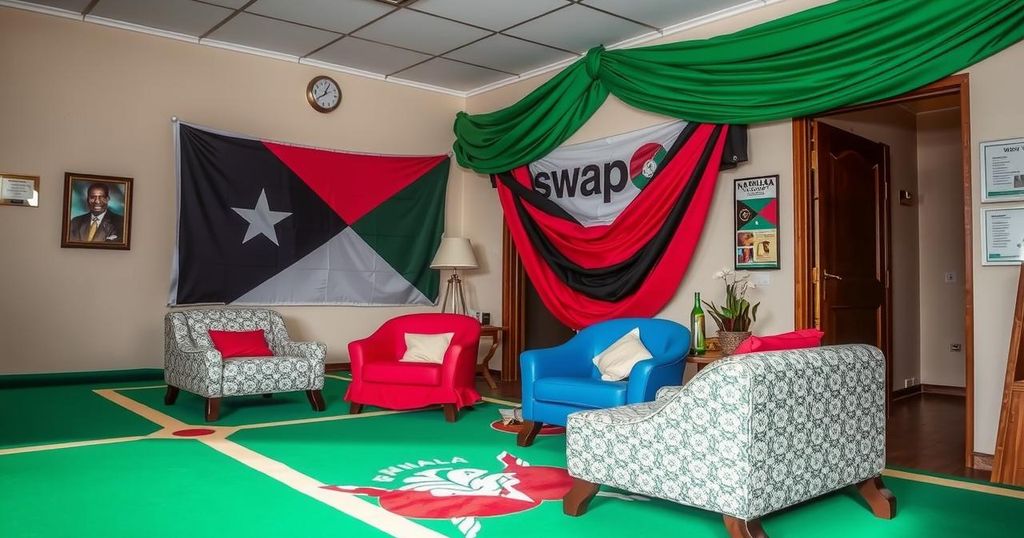World news
AFRICA, ALLIANCE DU CHANGEMENT, ALLIANCE LEPEP, BDP, BOTSWANA DEMOCRATIC PARTY, DEMOCRACY, ELECTIONS, GOVERNANCE, GOVERNMENT, MAURITIUS, MILITANT SOCIALIST MOVEMENT, NAMIBIA, NET, NETUMBO NANDI - NDAITWAH, OPPOSITION, PARLIAMENTARY SEATS, PR, PRAVIND JAGNAUTH, SAHARAN AFRICA, SWAPO
Lena Nguyen
0 Comments
Namibia Elections: Swapo Faces Setbacks Amid Growing Public Discontent
Namibia’s ruling Swapo party has retained power but suffered significant electoral losses amid widespread public discontent and opposition challenges in sub-Saharan Africa. With a 57% presidential vote, Swapo still faced irregularities and logistical issues during elections. This pattern reflects a larger trend of declining support for long-time governing parties throughout the region, indicating growing political engagement and demands for accountability among citizens.
Namibia’s ruling party, the South West Africa People’s Organization (Swapo), while maintaining its dominant position after over three decades of governance, has experienced significant electoral losses in the recent elections. Official results indicate that Netumbo Nandi-Ndaitwah received 57% of the presidential vote, making her Namibia’s first female leader. However, opposition parties have contested the election’s legitimacy due to various logistical challenges and reported irregularities. In a perplexing turn, Swapo’s presidential support increased despite its poorest performance in parliamentary elections, losing 12 of their 63 seats, casting doubt on their political strength.
Swapo is not isolated in this challenging electoral climate; across sub-Saharan Africa, governing parties have faced considerable setbacks this year. Nearly every election held under democratic principles has resulted in incumbents losing significant ground or even power altogether, driven by economic decline, public discontent with corruption, and the emergence of organized opposition movements. This may herald a continued trend into 2025, with governments previously perceived as secure facing unprecedented challenges.
The electoral defeats have resonated widely, with the Botswana Democratic Party (BDP) suffering a historic loss, plunging from 38 to just 4 parliamentary seats after ruling since independence in 1966. Similarly, Mauritius witnessed a dramatic political shift as the Alliance Lepep coalition secured only 27% of the votes, losing dominance to the opposition in a sweeping victory. Senegal also experienced a notable turnaround as opposition leader Bassirou Diomaye Faye won the presidency during a tumultuous pre-election period characterized by government suppression.
Governments in South Africa, while retaining power, have faced erosion of public support, exemplified by the African National Congress’s (ANC) decline below 50% of the vote, necessitating coalitions to form a government. These dynamics underscore a broader shift towards vibrant multiparty politics, with significant electoral engagement seen across the region. However, this surge in political contestation remains largely confined to countries viewed as having somewhat free electoral systems.
These trends reveal growing public intolerance towards corruption and abuses of power, leading to a diminished credibility for administrations. Citizens have rallied around opposition parties that emphasized economic mismanagement and political malfeasance. The rise in living costs further fueled public discontent, paralleling global dissatisfaction with inflation trends evident in other nations, including the United States and the United Kingdom.
For opposition groups, adopting lessons from past elections has been crucial; many have undertaken measures to protect electoral integrity, and coalition-building has been key in the electoral victories noted this year. If Ghana follows suit in its upcoming elections, 2024 could witness five opposition victories, marking a historical milestone in sub-Saharan Africa.
Significantly, the resilience observed in Africa’s political landscape amid a global trend favoring authoritarianism highlights the growing demand for accountable governance. Civil society and opposition factions have rallied effectively, while international observers are encouraged to recognize Africa’s potential for democratic resurgence, despite the presence of enduring authoritarian regimes. As articulated by Nic Cheeseman, Director of the Centre for Elections, Democracy, Accountability and Representation, this electoral landscape merits broader attention and understanding regarding its implications for democracy worldwide.
The 2024 elections in Namibia and other sub-Saharan African nations reveal a trend of declining support for long-standing ruling parties. These developments indicate a shift in political dynamics, reflecting the public’s growing discontent with economic conditions, corruption, and misuse of power. As many governing parties face unprecedented challenges at the ballot box, opposition groups are capitalizing on this moment of discontent to forge alliances and campaign under a unified front aimed at accountability and change in governance. This context is crucial for understanding the potential implications for the future political landscapes across the continent.
In summary, Namibia’s elections reflect a broader trend in sub-Saharan Africa, where incumbent parties, like Swapo, face significant challenges amid rising public frustration over economic issues and governance failures. As opposition groups demonstrate increasing political effectiveness and engage voters more actively, the 2024 electoral season in Africa may signal a turning point towards enhanced democratic accountability. Observers must acknowledge the region’s complex yet resilient political climate that continues to evolve in the face of global authoritarian pressures.
Original Source: www.bbc.co.uk




Post Comment